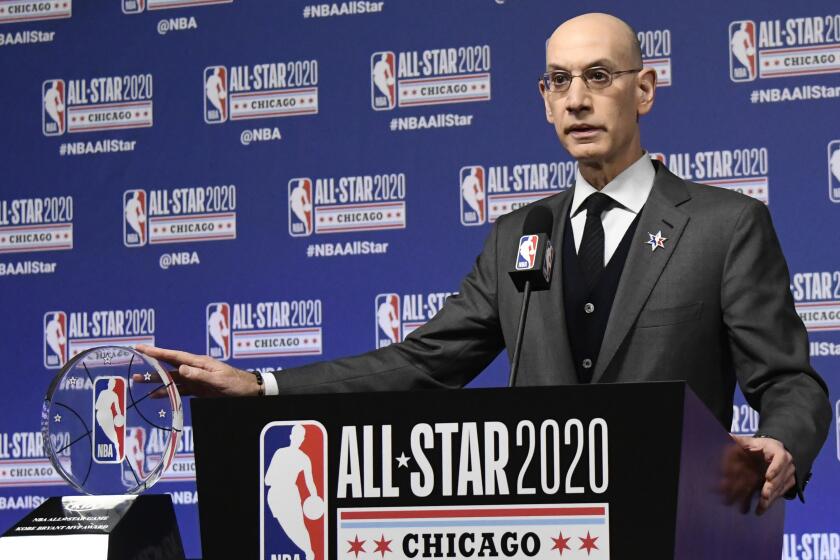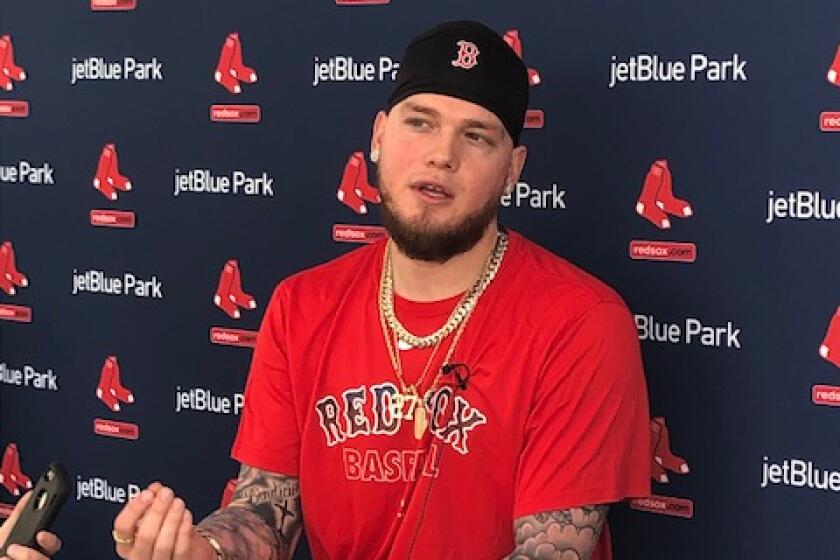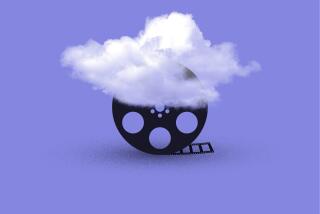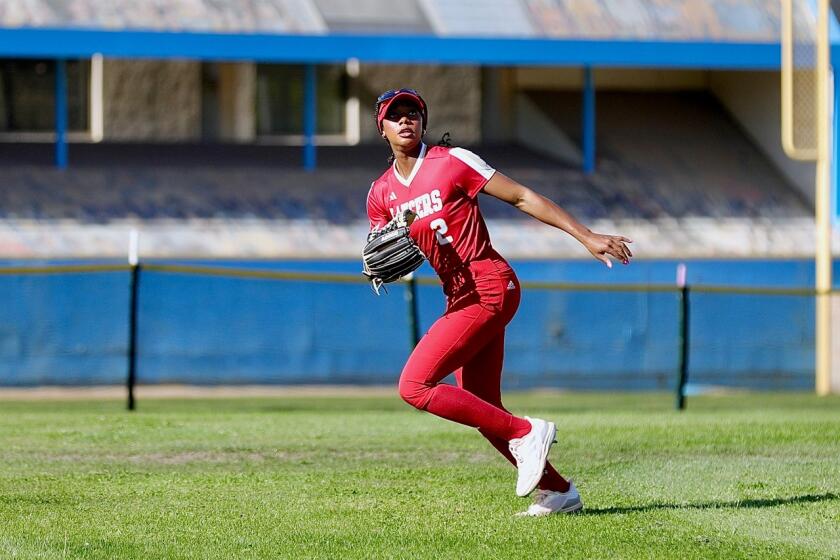Column: NBA has obstacles to hurdle with mental health awareness
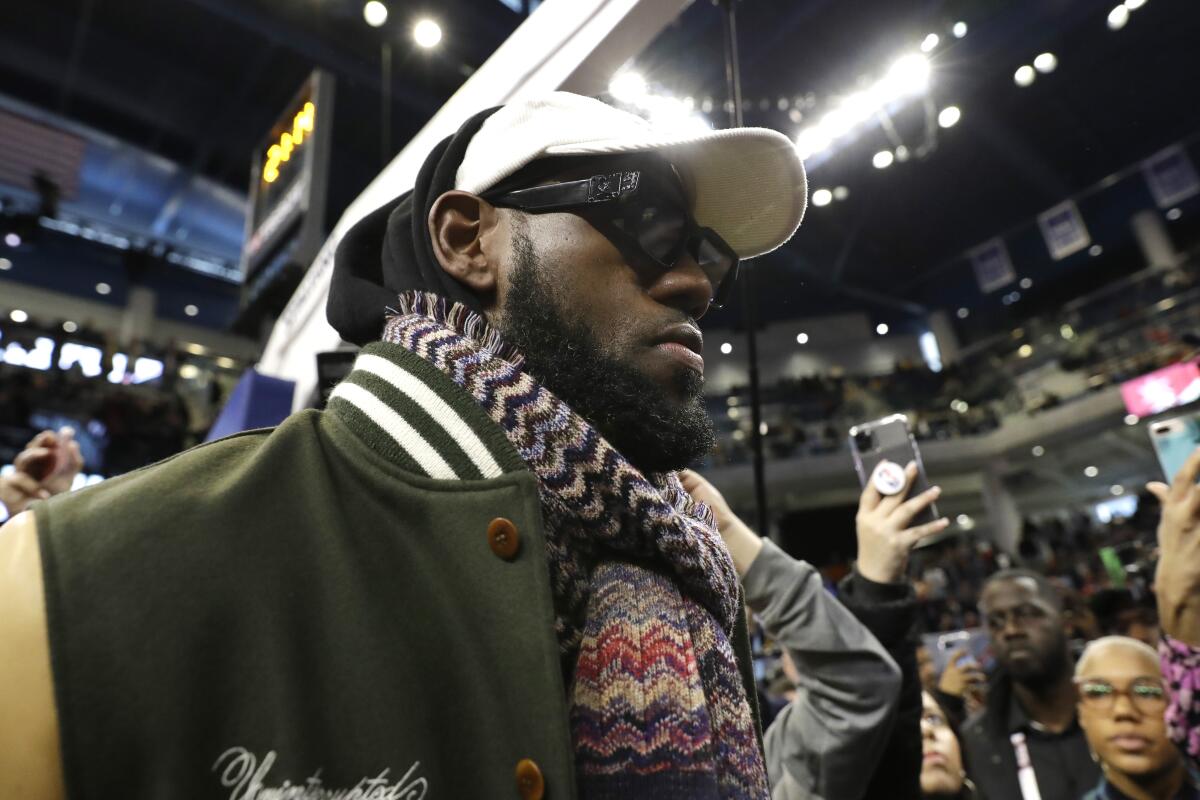
- Share via
CHICAGO — The names on the placards were as big as any in the NBA.
James Harden. Chris Paul. Anthony Davis.
Yet the pool of reporters and cameramen waiting for their arrival on media day during NBA All-Star weekend was minuscule compared with the legions of bodies surrounding the podium marked LeBron James. It would appear just as there’s been no noticeable drop-off in his play at 35, James’ star power has remained unscathed over the years as well.
“My biggest obstacle in leaving Akron was leaving my family and friends I grew up with my whole life,” he said in response to a question. “That’s always the biggest obstacle.”
It was perfect that a young person asked that question because it was a tangential reminder that James himself was once a child star. He became basketball’s first high school underclassman to make the cover of Sports Illustrated.
When we speak of James’ longevity, we typically home in on the physical aspect of his dominance. But it isn’t easy for someone to navigate decades of attention and scrutiny. This is why his partnership with the meditation and relaxation app Calm makes sense. When you’ve been the brightest star in a room full of stars for as long as he has, avoiding mental burnout is imperative. Fame and fortune can bring a plethora of opportunities and resources but as Chicago native Derrick Rose alluded to during a panel discussion earlier in the week, peace of mind isn’t necessarily one of them.
“I hate living with boundaries,” he told the audience. “It kills me when I go on vacation and I just know people are chilling there as a dentist or somebody with a regular job … they’re able to live the life to just walk around freely, and I’m jealous of that, because deep down I want that, but I can’t have it, so be careful for what you pray for because you’ll never know how it’ll turn out.”
That might come across as a rich guy whining. But dismissing Rose’s disclosure as “first-world problems” is one of the reasons why stigmas surrounding mental health in general, and athletes in particular, remain. The league has been lending resources to address mental wellness for years and this season required all teams to have at least one mental health professional on retainer as well as a written action plan for mental health emergencies. The players’ association hired Dr. William Parham to be its inaugural director of health and wellness in 2018, partnering with Keyon Dooling, who shared his heartbreaking story of how childhood trauma impacted his life as an adult.
The most valuable player of the NBA All-Star Game on Sunday will receive the Kobe Bryant MVP Award, Commissioner Adam Silver announced Saturday.
“I think collectively enough loud voices were heard to the point that the union felt it needed to do something,” said Parham, who has consulted with MLB, USA Soccer as well as universities such as UCLA . “I’m a person who believes in context, so when I look at these disclosures I see they came on the heels of the #metoo movement and #blacklivesmatter … identity reclamation, which is a canon from the 1960s. It’s people reclaiming their space as human beings. So for ballers, they’re acknowledging you like me for being a great athlete but you have to treat me as a person and not solely as a performer.”
One of Parham’s tasks is getting players not to view mental wellness as a synonym for mental illness. He talks about wellness being part of a continuum: some people are managing problems themselves, some need help, and some others are struggling to manage it. An example of that would be the disturbing video of ex-NBA player Delonte West, who was diagnosed with bipolar disorder, that went viral on social media last month. Many who commented on Twitter questioned why former teammates and the league didn’t help him. But former WNBA superstar Chamique Holdsclaw, who also was diagnosed with bipolar disorder, said it’s not that simple.
“You have to want to help yourself first, otherwise there’s very little other people can do,” she said. “You have to take your medication and you need a good support system for those times in which you’re struggling.”
Among the work Parham and Dooling have done is compile a directory of resources available to players in every city in which there is an NBA team as well as Las Vegas, where the Summer League is held. There is also a website with resources for players.
“Men don’t have the same permission to share what they need mentally as women,” Parham said. “With celebrity, they just don’t want to take the shine off of their star and that can be an issue. Add being African American and the history of race relations … and then the limited nature in terms of time one spends in the league. All of these aspects influence why some NBA players don’t get the help they may need.”
Alex Verdugo grew up cheering for David Ortiz and the Boston Red Sox. He knows the high expectations he’s facing as the man acquired for Mookie Betts.
As attitudes regarding mental health change culturally, players won’t have to juggle in secret. Then there is the attitude of the next generation of players coming in, according to Jessica Wagner, the NCAA’s associate director of prevention and health promotion. She is tasked with creating programming and public health initiatives to support health and wellness.
“Student-athletes have a voice in the NCAA through their National Student-Athlete Advisory Committees [SAACs],” she said. “All three divisional SAACs has stated that mental health is their number one health and well-being priority.”
All of which means hopefully by the time future players reach the NBA and become All-Stars themselves, instead of being handcuffed by old perceptions, they are liberated by familiarity.
“Everyone has baggage,” Parham said. “The question is how many bags do you have and what’s packed inside.”
And by everyone, he’s not talking solely about NBA players.
More to Read
Go beyond the scoreboard
Get the latest on L.A.'s teams in the daily Sports Report newsletter.
You may occasionally receive promotional content from the Los Angeles Times.
